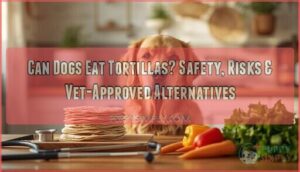This site is supported by our readers. We may earn a commission, at no cost to you, if you purchase through links.
Your dog just snatched a tortilla off your plate, and you’re wondering if you need to panic. The short answer: tortillas aren’t toxic to dogs, but they’re far from an ideal snack. A plain corn tortilla or flour tortilla won’t send your pup to the emergency vet, but these starchy discs pack empty calories, hidden sodium, and potential allergens that can upset sensitive stomachs or contribute to weight gain over time.
The real trouble starts when tortillas come loaded with onions, garlic, or excessive salt—common additions that turn a harmless carb into a genuine health risk. Whether your dog can safely enjoy the occasional tortilla depends on the ingredients, portion size, and your pet’s individual sensitivities.
Table Of Contents
- Key Takeaways
- Can Dogs Eat Tortillas?
- Nutritional Value of Tortillas for Dogs
- Risks of Feeding Tortillas to Dogs
- Common Tortilla Ingredients and Dog Safety
- Potential Allergies and Sensitivities
- Safe Ways to Offer Tortillas
- Dangers of Tortilla Fillings and Toppings
- Healthier Alternatives to Tortillas
- Signs Your Dog Should Avoid Tortillas
- Consulting Your Veterinarian About Dog Diets
- Frequently Asked Questions (FAQs)
- Can dogs eat raw flour tortillas?
- Can dogs have mission flour tortillas?
- Can dogs eat tortillas with butter?
- Are tortillas safe for dogs?
- What if my dog eats a whole bag of tortillas?
- Can animals eat corn tortillas?
- Can dogs eat tacos?
- Are tortillas harmful to puppies?
- Can tortillas cause dogs to get sick?
- Do dogs need gluten-free tortillas?
- Conclusion
Key Takeaways
- Plain tortillas are not toxic to dogs, but they deliver empty calories, excessive sodium, and potential allergens without any real nutritional benefit worth the risks.
- The real danger lies in common tortilla fillings and seasonings—onions and garlic, excessive salt, and spices can cause serious health problems ranging from digestive upset to toxicity.
- Dogs with gluten intolerance, grain allergies, or pre-existing conditions like diabetes, pancreatitis, or kidney disease should avoid tortillas entirely due to compounded health risks.
- If you choose to offer tortillas, stick to plain varieties in tiny portions (no more than a quarter tortilla for small dogs), but healthier alternatives like plain cooked grains or homemade dog biscuits are always the smarter choice.
Can Dogs Eat Tortillas?
You’ve probably caught your dog eyeing your lunch and wondered if a piece of tortilla would hurt. The short answer isn’t as simple as yes or no—it depends on several factors.
Before you share, it’s worth understanding what happens when dogs eat tortillas and which types pose the biggest concerns.
Let’s break down what you need to know about tortilla safety, the quick verdict, and what to watch for as a responsible dog owner.
Are Tortillas Safe for Dogs?
Plain tortillas aren’t toxic to your dog, but they fall into that gray zone between safe and smart. As a veterinary nutritionist, I see three key safety factors you should weigh:
- Ingredient simplicity – Plain corn or flour tortillas without added salt, fat, or seasoning pose minimal immediate danger
- Portion control – Even safe foods can cause digestive upset or weight gain when overfed
- Individual sensitivities – Some dogs have gluten intolerance or corn allergies that make tortillas problematic
It’s important to remember that the risks of feeding corn tortillas include potential toxic ingredients and high salt content.
Yes or No—quick Answer
The short answer: yes, dogs can eat tortillas—but you should almost always skip them. While a bite of plain, low-salt tortilla won’t poison your pup, there’s no real upside to including it in their canine diet. Tortilla safety depends heavily on ingredients, portion size, and your dog’s individual food allergies or sensitivities.
Here’s a quick reference for pet owner guidelines:
| Tortilla Type | Safety Level | Canine Health Risks |
|---|---|---|
| Plain corn (no salt) | Low risk | Minimal if small portions |
| Plain flour (low salt) | Moderate risk | Gluten issues in sensitive dogs |
| Seasoned or fried | High risk | GI upset, sodium toxicity, weight gain |
| With fillings/toppings | Very high risk | Toxic ingredients, choking hazards |
Most dog nutrition experts agree: tortillas offer empty calories without supporting overall dog health or food safety standards your pet deserves.
Key Considerations for Dog Owners
Before you toss your dog a tortilla, think beyond the yes-or-no question. Responsible ownership means understanding Dog Nutrition Basics and Pet Food Safety—not just what won’t kill your pet, but what actually promotes their canine health.
Before sharing tortillas with your dog, ask not just if it’s safe, but whether it actually supports their health
Consider your dog’s individual food allergies, current weight, and whether those empty carbs fit into Balanced Diets. Pet nutrition isn’t one-size-fits-all, and Canine Health Risks vary by breed, age, and existing conditions.
Nutritional Value of Tortillas for Dogs
When you look at a tortilla from a nutritional standpoint, it becomes clear why these flatbreads weren’t designed with dogs in mind. They’re packed with calories and carbs but surprisingly low on the nutrients your dog actually needs.
Let’s break down what’s really in a tortilla and why it matters for your pup’s health.
Carbohydrates and Calorie Content
Tortillas pack more carbohydrates than many dog owners realize. A single 6-inch tortilla delivers 120 to 150 calories—mostly from starch—which can disrupt your dog’s energy balance if offered too often.
Consider these calorie realities for your canine:
- Each gram of carbs equals 4 calories, adding up fast
- Corn and wheat tortillas contain 20 to 25 grams of carbohydrates
- Fried versions spike calorie density even higher
- Low dietary fiber means minimal nutrient density
- Treats shouldn’t exceed 10% of your dog’s daily calorie needs
Protein and Fat Levels
Your dog needs about 18 to 30 percent protein in diet to maintain muscle and immune health. Tortillas deliver only 2 to 4 grams of protein per serving—far below canine dietary requirements.
Fat content hovers around 2 to 3 grams, offering minimal energy despite calories piling up from carbs. This imbalance disrupts proper nutrient ratios your dog relies on for ideal energy needs.
Vitamins, Minerals, and Fiber
Most commercial tortillas fall short in vitamins and minerals your dog needs for daily health. You won’t find meaningful levels of vitamin D, B vitamins, or essential trace minerals like iron or zinc.
Even seemingly safe seasonings can pose risks—avoid feeding your dog Alfredo sauce, which often contains garlic and onion that are harmful to canines.
Fiber intake sits around 1 to 2 grams per tortilla—barely a dent in canine dietary needs. This nutrient imbalance won’t support proper nutrient absorption or prevent mineral deficiency long-term.
Risks of Feeding Tortillas to Dogs
While tortillas aren’t toxic to your dog, they’re not exactly doing them any favors either.
The real trouble comes from what’s hiding in those seemingly harmless flatbreads—ingredients that can quietly undermine your dog’s health.
Let’s look at the three main concerns you should know about before sharing your next taco night.
Salt and Sodium Concerns
One tortilla can pack more salt than your dog should have all day—and that’s a problem. Dogs need far less sodium than we do, and what seems like a harmless snack can quickly tip them into dangerous territory.
The issues with excess salt are numerous, including:
- Excess salt causes increased thirst and urination, straining the kidneys over time
- High sodium intake raises blood pressure and stresses the cardiovascular system
- Sodium toxicity can lead to tremors, seizures, or even death in severe cases
- Processed tortillas often contain hidden sodium beyond what you’d expect
- Small dogs reach unsafe sodium levels much faster than larger breeds
Additives and Preservatives
Store-bought tortillas often contain a cocktail of preservatives and additives that weren’t designed with your dog in mind. Ingredients like BHA, BHT, and sodium benzoate extend shelf life but can trigger chemical reactions in sensitive pets.
Some dogs develop intolerances or allergies to these substances, while others face more serious toxic ingredient exposure. Pet food safety standards don’t apply to human snacks.
Obesity and Weight Gain Risk
A few innocent tortilla scraps might seem harmless, but those empty calories add up faster than you’d think. Calorie intake beyond your dog’s daily needs converts directly to fat storage—and tortillas deliver plenty without the nutrition balance dogs require.
- Excess calories disrupt weight management and promote obesity over time
- Poor diet planning with frequent human food leads to gradual weight gain
- High-carb snacks increase health risks without supporting proper nutrition advice
- Regular tortilla treats can derail an otherwise balanced dog diet
Common Tortilla Ingredients and Dog Safety
Not all tortillas are created equal in terms of what’s inside them. The ingredients can vary wildly depending on whether you’re grabbing a store-bought flour tortilla or a simple corn version.
Let’s break down what’s actually in these flatbreads and how each component affects your dog’s health.
Wheat Flour Vs. Corn Flour
Most tortillas you find on grocery shelves fall into two camps: wheat flour or corn.
Wheat flour tortillas pack about 12 grams of protein per 100 grams and form that familiar soft, chewy texture thanks to gluten.
Corn tortillas are naturally gluten-free, with only 3-4 grams of protein but a distinct sweetness. For dogs with gluten intolerance, corn wins hands down.
Additionally, choosing between these tortillas comes down to their nutritional profiles and origins.
Gluten Intolerance in Dogs
Some dogs react poorly to gluten intolerance, showing signs like chronic diarrhea, vomiting, and itchy skin. Gluten intolerance isn’t common in canines, but when it happens, you’ll notice digestive upset or coat problems that improve on gluten-free diets.
Watch for these symptoms if your dog eats wheat tortillas:
- Loose stools or mucus in feces
- Recurrent ear infections
- Weight loss despite normal appetite
- Dull, thinning coat or persistent itching
Switching to corn tortillas helps sensitive dogs avoid these reactions entirely.
Harmful Additives and Seasonings
Beyond gluten intolerance, many tortillas harbor toxic preservatives, artificial flavorings, and seasoning dangers that put your dog at risk. Store-bought varieties pack MSG effects and sodium risks—even small servings can exceed safe limits. Garlic or onion powder in seasoning blends is outright poisonous, while benzoates and sorbates trigger stomach upset in sensitive pups.
| Harmful Additive | Why It’s Risky |
|---|---|
| Garlic/Onion Powder | Toxic to dogs, damages red blood cells |
| MSG (Monosodium Glutamate) | Causes vomiting, affects fluid balance |
| Artificial Colors | Triggers allergies and food intolerance |
| Excess Sodium | Raises blood pressure, worsens kidney issues |
Potential Allergies and Sensitivities
Not every dog reacts to tortillas the same way. Some will handle a small piece just fine, while others might develop symptoms that signal an underlying sensitivity or allergy.
Knowing what to watch for helps you catch potential problems early and keep your dog comfortable.
Signs of Gluten or Grain Allergies
Your dog’s body will tell you when gluten intolerance or grain allergies are causing problems. Watch for these key allergic reactions:
- Digestive distress – Chronic diarrhea or alternating bowel issues after eating foods with gluten
- Skin inflammation – Itchy paws, belly rashes, or red ears appearing within hours of grain ingestion
- Ear infections – Recurrent otitis accompanying food sensitivities and immune responses
Reactions to Preservatives
When commercial tortillas contain sulfites, benzoates, or synthetic colorants, your dog’s immune system might launch an allergic reaction. Preservative sensitivity shows up as breathing difficulty, hives, or vomiting within hours.
Here’s what to watch for:
| Preservative Type | Common Reactions |
|---|---|
| Sulfites | Wheezing, coughing |
| Benzoates | Skin itching, upset stomach |
| Artificial Dyes | Hives, digestive distress |
Always check ingredient lists before sharing.
Monitoring for Allergic Symptoms
Usually, you’ll spot signs within hours—but sometimes reactions creep in over days. Keep a symptom diary tracking itching, hives, or respiratory changes like coughing. Note gastrointestinal upset (vomiting or diarrhea) and any facial swelling.
This health logging helps your vet identify food allergy patterns and decide if sensitivity testing is needed. Two weeks of reaction monitoring gives you solid data on your dog’s canine health.
Safe Ways to Offer Tortillas
If you’ve decided to share a small piece of tortilla with your dog, doing it the right way matters. The type you choose, how much you offer, and how you prepare it can make the difference between a safe treat and a stomach upset.
Let’s walk through the safest approach to offering tortillas without putting your dog’s health at risk.
Plain Vs. Flavored Tortillas
When scanning ingredient lists for tortilla safety, plain varieties win hands down. Plain corn or wheat tortillas usually contain just flour, water, and a little salt—around 120 to 240 milligrams per tortilla.
Flavored versions, though, pack extra seasonings like garlic powder or onion powder (both toxic to dogs), plus added oils and preservatives that stress your dog’s digestive system unnecessarily.
Portion Size and Frequency
Even a single tortilla can deliver 50 to 70 calories—substantial for any canine diet. Stick to no more than a quarter or third of one tortilla for small dogs, keeping total treats under 10 percent of Daily Calorie Limits.
Offer tortillas two to three times weekly at most, spacing them six to eight hours apart to avoid digestive upset and maintain healthy Portion Control.
Preparation and Serving Tips
Prepare tortillas the same way you’d handle any new food—with care and attention to detail. Follow these steps for Safe Serving:
- Choose Plain Tortilla options without added salt or seasonings to minimize dog health risks
- Practice proper Tortilla Cutting into bite-sized pieces preventing choking
- Warm briefly to soften for easier digestion (skip butter or oils)
- Monitor your Dog Portion closely, adjusting for gluten intolerance if needed
Dangers of Tortilla Fillings and Toppings
Even a plain tortilla might seem harmless, but the real danger often hides in what you pile on top.
Many common fillings contain ingredients that range from mildly upsetting to downright toxic for your dog.
Let’s look at the specific toppings and fillings you need to avoid.
Toxic Foods in Common Fillings
Many tortilla fillings hide serious dangers for your dog. Onions and garlic powder cause garlic poisoning by damaging red blood cells, even in tiny amounts.
Vinegar toxicity from dressings triggers vomiting and stomach irritation. Chopped chilis create chili irritation—think mouth burns and potential pancreatitis.
Fatty meats increase sodium overload risks, while these ingredients combined often spark food allergies in dogs and severe gastrointestinal issues.
Cheese, Salsa, and Spices
You might think cheese adds harmless richness, but it often causes lactose intolerance in dogs—leading to diarrhea and gas.
Salsa recipes with tomatoes, onions, and cilantro create stomach upset and potential toxicity. Spice blends like cumin and chili powder irritate your dog’s digestive tract.
These flavor profiles that augment tortillas and fillings become genuine threats to canine diet safety.
Choking Hazards and Digestion
Beyond flavor concerns, the texture and size of tortilla pieces create real swallowing risks. Doughy tortillas can compress into a tight wad that lodges in your dog’s throat, causing airway obstruction.
Large bites may lead to esophageal blockage as they struggle to pass through. Even plain tortillas digest slowly, increasing stomach workload and potential digestion issues in canine diet management.
Healthier Alternatives to Tortillas
If you want to give your dog a treat without the risks that come with tortillas, plenty of better options exist. These alternatives offer more nutritional value and fewer concerns about salt, additives, or empty calories.
Let’s look at some vet-approved choices that’ll keep your pup happy and healthy.
Dog-friendly Grains and Treats
Instead of tortillas, you can offer your dog healthier grain options that support canine nutrition without excess salt or preservatives.
Plain cooked oats, brown rice, and quinoa make safe, gluten-free dog treats when served in small portions.
If your dog has gluten intolerance, choose grain-free diets featuring sweet potato or chickpea-based pet food safety alternatives that deliver balanced energy.
Homemade Dog Biscuit Options
You can bake simple homemade dog treats using ingredients you likely already have. Banana biscuits combine oat flour with mashed banana and one egg for a gentle snack.
Peanut butter treats mix natural peanut butter with pumpkin and whole wheat flour (or grain free options like chickpea flour). These homemade recipes let you control salt and healthy fats while supporting your dog’s canine diet without questionable additives.
Commercial Dog Snack Recommendations
When homemade treats don’t fit your schedule, commercial dog snack recommendations offer reliable options. Look for healthy biscuits with a complete ingredient list and guaranteed protein analysis on pet food labels.
Choose grain-free varieties if your dog has sensitivities, and check snack safety details like calorie counts per treat. These support canine nutrition without the tortillas and dogs risk.
Signs Your Dog Should Avoid Tortillas
Not every dog can handle tortillas without issues. Some pups show clear signs that these flatbreads don’t agree with their system.
Watch for these three warning signals that tortillas should stay off your dog’s menu.
Digestive Upset and Diarrhea
If your dog develops loose stools after eating tortillas, you’re likely seeing a reaction to excess salt, gluten, or additives that disrupt gut health. Canine diarrhea can signal digestive problems ranging from mild stomach issues to more serious gastrointestinal health concerns.
Watch for mucus in stool or increased urgency—both hint that tortillas triggered digestive issues your dog can’t handle well.
Allergic Reactions and Skin Issues
Redness around your dog’s muzzle or paws after eating tortillas often signals food allergies tied to wheat or corn. You might notice persistent scratching, hives, or patches of dermatitis caused by gluten intolerance.
Skin irritation and allergic responses can escalate quickly, so allergy testing helps pinpoint the trigger. Itch relief starts with removing tortillas from your dog’s diet entirely.
Pre-existing Health Conditions
Chronic illness like diabetes or pancreatitis makes your dog’s medical history a critical factor in nutrition planning. If your pup already battles kidney disease or obesity, tortillas add health risks through excess sodium and empty calories.
Food allergies and gluten intolerance compound the problem. Always prioritize veterinary care when managing canine diet and wellness—your vet tailors safe feeding strategies that protect dogs with underlying conditions.
Consulting Your Veterinarian About Dog Diets
Your vet is your best partner in making smart food choices for your dog. They know your pet’s health history and can give you tailored advice that generic guidelines just can’t match.
Here’s when and how to bring your veterinarian into the conversation about what goes in your dog’s bowl.
When to Seek Professional Advice
You should schedule a vet consultation if your dog shows persistent vomiting or diarrhea lasting over 24 hours, hasn’t eaten for 48 hours, or displays dehydration signs like dry gums.
Emergency care becomes critical with breathing trouble, bloody stool, or sudden collapse.
For ongoing health monitoring and nutrition counseling, your veterinarian provides specialized veterinary advice and guidance suited to your pet’s unique needs.
Customizing Your Dog’s Nutrition
Your veterinarian can build a tailored diet around your dog’s complete profile—age, breed, weight, activity level, and food sensitivities. They’ll set calorie control targets, recommend nutrient balance ratios, and adjust portions for life stage changes.
This canine nutrition approach beats one-size-fits-all formulas because it caters to your pet’s unique needs. With veterinary guidance, you’ll transform general feeding into a truly specialized dog nutrition plan.
Monitoring Long-term Health Impacts
Even a snack as simple as a tortilla can ripple through your dog’s health over months or years. Your veterinarian will use regular health tracking to catch subtle shifts before they escalate.
- Body condition score checks every visit reveal weight trends tied to treat habits and help adjust nutrient balance.
- Blood panels screen for early metabolic changes linked to longterm effects of calorie-dense foods.
- Diet monitoring logs you share give context for symptoms like chronic diarrhea or skin issues.
Consistent veterinary care turns small observations into actionable insights, protecting your dog’s health and wellness while honoring their canine dietary needs.
Frequently Asked Questions (FAQs)
Can dogs eat raw flour tortillas?
Your dog might sniff that raw flour tortilla with interest, but uncooked dough is harder to digest and offers zero nutritional benefit.
It can swell in the stomach, posing bloating risks.
Can dogs have mission flour tortillas?
Mission flour tortillas contain salt, preservatives, and additives that aren’t ideal for dogs.
You can offer a small plain piece occasionally, but watch for digestive upset and prioritize healthier homemade treats instead.
Can dogs eat tortillas with butter?
You shouldn’t give your dog tortillas with butter. The added saturated fat and lactose can upset canine digestion and may trigger pancreatitis in at-risk dogs, making plain options safer.
Are tortillas safe for dogs?
Plain tortillas pose minimal toxicity risk for canine nutrition, but high sodium and preservatives create pet health risks.
Following dietary guidelines means limiting portions severely. Tortilla safety depends on ingredients—skip seasonings, fillings, and flavored varieties entirely.
What if my dog eats a whole bag of tortillas?
Your dog scarfing down an entire bag isn’t life-threatening, but watch for vomiting, diarrhea, or excessive thirst from Tortilla Overconsumption. Contact your vet if Canine Stomach Issues persist beyond 24 hours.
Can animals eat corn tortillas?
Most animals can handle corn tortillas in moderation, though safe snack options depend on species-specific canine dietary needs.
Watch for corn allergy risks and food allergy symptoms affecting animal digestive health and pet food safety.
Can dogs eat tacos?
Dogs shouldn’t eat tacos because common fillings like onions, garlic, salsa, and spices are toxic or irritating.
Taco meat safety depends on seasoning—plain grilled chicken works better than fatty, spiced ground beef for canine diet plans.
Are tortillas harmful to puppies?
Yes, tortillas pose risks to puppies. High sodium levels, empty calories, and potential allergens can upset their developing systems.
Their smaller size makes them more vulnerable to weight gain and digestive issues from processed ingredients.
Can tortillas cause dogs to get sick?
While most tortillas won’t poison your pup, they can trigger upset stomachs, vomiting, or diarrhea—especially if seasoned or eaten in large amounts.
Food allergies and sodium poisoning are real health risks too.
Do dogs need gluten-free tortillas?
Most dogs don’t need gluten-free tortillas unless they have diagnosed gluten sensitivity. Plain corn tortillas naturally lack gluten, but they’re still high in calories and salt—so moderation matters most.
Conclusion
Sure, tortillas won’t poison your dog—but that doesn’t make them a smart choice. The sodium, empty calories, and allergy risks outweigh any convenience of tossing scraps their way.
Can dogs eat tortillas occasionally? Yes, plain ones in tiny amounts. Should they? Not when you’ve got healthier options waiting. Skip the starchy handouts and reach for treats that actually fuel their health instead of padding their waistline. Your dog deserves better than table leftovers.
- https://dogs.shababy4us.com/can-dogs-eat-tortillas/
- https://pmc.ncbi.nlm.nih.gov/articles/PMC6906133/
- https://www.merckvetmanual.com/dog-owners/digestive-disorders-of-dogs/disorders-of-the-stomach-and-intestines-in-dogs
- https://vcahospitals.com/know-your-pet/testing-for-weight-loss-in-dogs
- https://www.gardensanimalhospital.com/how-often-should-i-take-my-dog-or-cat-to-the-vet/


















